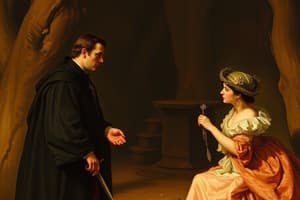Podcast
Questions and Answers
Summarise what happens in Act 2 Scene 3.
Summarise what happens in Act 2 Scene 3.
It begins with a drunken porter who rambles on about Macbeth's castle being the gateway of hell. Next, Macduff and Lennox arrive, discussing the bizarre weather of the night, followed by Macduff revealing the shocking news of Duncan's death.
What is the porter representing, and what is the purpose of this in the beginning of Act 2 Scene 3?
What is the porter representing, and what is the purpose of this in the beginning of Act 2 Scene 3?
The porter provides comedic value through his drunken behavior and represents the metaphor of being the gatekeeper of hell. He reflects that the castle is hell due to Macbeth's sinful behavior, relieving the audience's tension before the news of Duncan's murder.
What can be inferred about the character of Macduff from the quote, 'Is thy master stirring?'?
What can be inferred about the character of Macduff from the quote, 'Is thy master stirring?'?
It shows Macduff as a dutiful and trusted ally to King Duncan, with a strong moral center unlike Macbeth. It foreshadows that he will seek revenge on Macbeth later by restoring justice.
How is Macbeth viewed by others in the King's court, using the quotes 'Good morrow, noble sir' and 'Is thy king stirring, worthy thane'?
How is Macbeth viewed by others in the King's court, using the quotes 'Good morrow, noble sir' and 'Is thy king stirring, worthy thane'?
Explain the implications of the quote, 'The night has been unruly: where we lay our chimneys were blown down; and, as they say lamenting heard I' the air; strange screams of death.'
Explain the implications of the quote, 'The night has been unruly: where we lay our chimneys were blown down; and, as they say lamenting heard I' the air; strange screams of death.'
What references can be seen in the quote, 'And prophesying with accents terrible of dire combustion and confusing events'?
What references can be seen in the quote, 'And prophesying with accents terrible of dire combustion and confusing events'?
How does Lennox's language create an image that seems apocalyptic, using the quote, 'the earth was feverous and did shake'?
How does Lennox's language create an image that seems apocalyptic, using the quote, 'the earth was feverous and did shake'?
How would you describe Macduff's reaction to the murder? How does the repetition of 'horror' emphasize this?
How would you describe Macduff's reaction to the murder? How does the repetition of 'horror' emphasize this?
How does Macduff here contrast with the violent form of masculinity portrayed by Macbeth?
How does Macduff here contrast with the violent form of masculinity portrayed by Macbeth?
What type of imagery is used in the quote, 'Most sacrilegious murder hath broke ope the Lord's anointed temple, and stole thence,' and what can you infer from this?
What type of imagery is used in the quote, 'Most sacrilegious murder hath broke ope the Lord's anointed temple, and stole thence,' and what can you infer from this?
Study Notes
Overview of Act 2 Scene 3
- Opens with a porter, humorously representing the gatekeeper of hell, using drunken ramblings to introduce the theme of chaos in Macbeth’s castle.
- Macduff and Lennox arrive to discuss ominous weather, setting a foreboding tone.
- Macduff reveals the shocking news of King Duncan’s murder.
Role of the Porter
- Provides comic relief amidst tension, using humor to ease the atmosphere following Duncan's murder.
- Represents hell, highlighting the castle's moral corruption under Macbeth's rule.
Macduff’s Characterization
- Reflected in his query, "Is thy master stirring?", showcasing his loyalty and moral integrity compared to Macbeth.
- Suggests future conflict, indicating Macduff’s role as the avenger of Duncan’s death.
Macbeth’s Reputation
- Valued for his nobility, seen through terms like "noble sir" and "worthy thane."
- Creates dramatic irony, contrasting his honorable image with his upcoming betrayal.
Disruption of Natural Order
- Lennox describes the night as "unruly," indicating chaos resulting from Macbeth and Lady Macbeth’s actions.
- Phrases like "lamentings heard" and "strange screams of death" illustrate the world mourning Duncan's assassination and foreshadowing consequences.
References to Prophesy
- "Prophesying" evokes the witches, linking Macbeth’s fate to supernatural elements.
- "Of dire" echoes Lady Macbeth’s earlier ambitions, stressing the interplay between prophecy and action.
Apocalyptic Imagery by Lennox
- Describes the earth as "feverous and did shake," suggesting an apocalyptic scenario, enhancing the scene’s tension.
- Reflects themes in Macbeth’s soliloquies about the chaos resulting from his deeds.
Macduff’s Reaction
- Demonstrates profound shock through repeated exclamations of "horror," emphasizing the brutality of Duncan's murder.
- The emotional extremity underscores Macduff's innocence and humanity, contrasting with Macbeth’s detached nature.
Masculinity and Emotion
- Macduff’s expressions of grief showcase genuine human emotions, unlike Macbeth’s coldness.
- His moral compass highlights the conflict between different representations of masculinity in the play.
Religious Imagery
- "Most sacrilegious murder" signifies the violation of divine order and the sacred nature of kingship.
- The metaphor of "Lord's anointed temple" symbolizes King Duncan as divinely chosen, illustrating the grave implications of regicide.
Studying That Suits You
Use AI to generate personalized quizzes and flashcards to suit your learning preferences.
Description
Dive into the key elements of Act 2 Scene 3 of Macbeth with these flashcards. Explore the drunken porter's role, the discussions between Macduff and Lennox, and the shocking revelation of Duncan's death. Enhance your understanding of Shakespeare's work through focused questions and insights.




